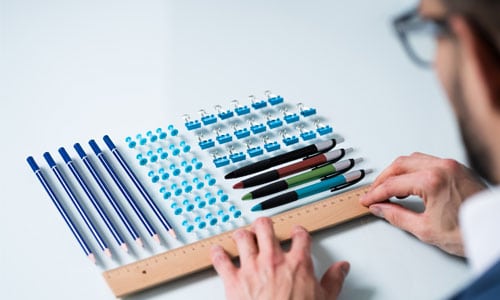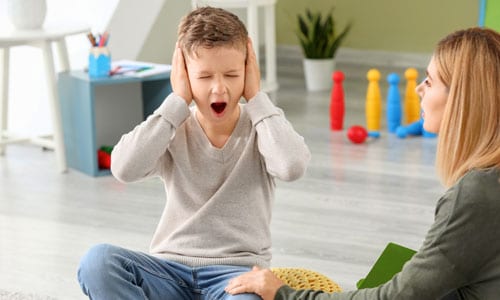ADHD and OCD: When Do They Co-Occur and How to Tell Them Apart
28th August 2020
Dating someone with Attention-Deficit/Hyperactivity Disorder (ADHD) can be a roller-coaster of emotions, with highs, lows, and unexpected turns.
It can be exciting, exhausting, and confusing – often all at the same time.
ADHD doesn’t define a person, but it can – and will – undoubtedly shape their experiences, behaviours and perceptions of the world around them.
This inevitably extends to their relationships.
And so, there will be challenges in dating someone with ADHD as with any mental health condition.
But that shouldn’t take away from the shared expression of your humanity.
Dating someone with ADHD can be just as beautiful an experience as dating anyone else; if you’re able to love the qualities of your partner – regardless of the labelling.
Loving from a place of awareness of human needs – free of diagnosis.
How to Date Someone with ADHD: A Comprehensive Guide
Dating someone with Attention-Deficit/Hyperactivity Disorder doesn’t ask you to do anything you wouldn’t do in any other relationship. The same basic principles still apply. They just look slightly different based on the needs of your partner. The core components of understanding, patience, open communication, flexibility and empathy remain just as important as in any other romantic relationship.
Dating a Guy with ADHD: What You Need to Know
Men with ADHD are generally known to exhibit more tendencies towards hyper-focus, impulsivity, forgetfulness, and sometimes emotional volatility – although they can also appear inattentive in their expression of ADHD. These externalising symptoms mean a male partner may struggle with organising tasks such as planning dates, being on time, and not being fully present in conversation which may present as appearing self-centred. But in the reverse expression, it can also lead to them being incredibly passionate, creative and empathetic.
Dating a Woman with ADHD: Understanding the Differences
Women with ADHD are often seen to present more on the inattentive side of the ADHD spectrum, meaning they may internalise a lot more so than males. This can lead to the suppression of their emotions and personal struggles, which can lead to anxiety and depression if left unchecked. However, this doesn’t mean that there isn’t a capacity to be creative, spontaneous and caring, also. It simply means the woman you’re dating with ADHD who is presenting as inattentive will likely have a rich inner world and may simply require more consistent presence to feel safe in order to express themselves.
ADHD Toxic Relationships: How to Spot and Avoid Them
The term ‘toxic relationship’ is a somewhat harsh term to describe the state of a connection. It’s important to remember the distinction between what are genuine needs that can be supported and what constitutes overt manipulation. When dating someone with ADHD – as in any relationship – it’s important to recognise what can be supported and what cannot be tolerated.
Frequent Misunderstandings: If your partner’s ADHD symptoms, such as impulsivity or inattentiveness, are often causing misunderstandings or conflicts in your relationship, it’s a sign they may not be managing these symptoms as well as they should.
Overuse of ADHD as an Excuse: If your partner is regularly using their ADHD as a reason for not meeting their responsibilities are addressing issues with a relationship it could indicate that they may be leading into bypassing or manipulation.
Reliance on Partner for Management: If the person you’re dating with ADHD it’s becoming overly dependent on you for managing their daily tasks and/or ADHD symptoms, it could be a sign that the balance within your relationship needs to be readdressed.
Impulsive Behaviour Affecting Relationship: If the person you’re dating is engaging in regular impulsive actions that are negatively affecting your relationship, such as frequently changing plans or making demands, it could lead to an inequality in the dynamic.
Inconsistent Engagement: A consistent lack of willingness to engage can also lead to situations of neglect, where one partner’s needs dominate the relationship. Over time, this can lead to resentment and bitterness if not addressed.
The Complexity of ADHD and Love
Dating someone with ADHD can be both an exhilarating and complex experience. There may be times of incredible vibrancy and connection contrasted with periods of misunderstandings and disconnection. And there is no blame here. It’s simply a case of the individual you’re dating with ADHD having a different way of expressing that love and the need for their partner to understand how they express themselves. By acknowledging their patterns, you can work together to overcome these challenges and deepen into a more meaningful connection.
ADHD Falling in Love Quickly: Navigating the Whirlwind Romance
Individuals with ADHD can often exhibit intense emotions and impulsivity, which can translate into falling in love head over heels. This isn’t necessarily a bad thing. There’s something magical about the thrill of a whirlwind romance. However, if this choice is rooted in impulsivity rather than true love, it can lead to patterns of dysfunction because the signs of incompatibility weren’t acknowledged before rushing ahead with the relationship. So if you are aware you’re dating someone with ADHD and things are moving extremely quickly, it might be wise to take a step back and reassess the dynamic.
Signs to Watch Out For:
Accelerated Relationship Progression: If your partner is always the one initiating the progression of the relationship and major milestones, such as moving in together, meeting your family and discussing future plans within weeks of dating, it could be a sign of their impulsivity taking over.
Intense Emotional Swings: If your partner is experiencing extreme highs and lows in their emotional state, i.e. extremely outgoing and romantic one day and more muted the next, it could also be a sign their impulsivity is driving the relationship and not true love.
Neglect of Other Responsibilities: If your partner quickly becomes dissociated with other aspects of their life, including friends, family and other responsibilities, it could mean be an indication that their impulsivity has led to a state of infatuation, which isn’t grounded in true love but insecurity.
ADHD Jealousy in Relationships: Understanding and Managing It
Because of the nature of hyper-focus in those with ADHD, it can often lead to obsessiveness and possessiveness, which, in turn, can lead to jealousy in committed relationships. This can often be rooted in insecurities and the fear of abandonment, which contributes to an insecure and often anxious attachment style. Recognising jealousy as a symptom – not a personal affront – and approaching the issue with compassionate and non-judgemental dialogue can help manage those feelings and contribute to a more secure and stable dynamic in the long term.
How ADHD Affects Communication in Relationships
Dating someone with ADHD brings additional communication challenges. These include forgetfulness, distractibility, impulsivity and emotional intensity. These symptoms can often lead to misunderstandings and disruptions in conversations. As such, it’s not uncommon for people with ADHD to forget key points in the conversation and sometimes lose the context entirely. The inconsistency of attention is one of the core struggles of anyone living with ADHD, which can also lead to unwanted interruptions due to impulsivity. This impulsivity can also lead to the escalation of arguments, which is also rooted in an inability to regulate emotions – emotional deregulation.
How to Communicate with an ADHD Partner Effectively
When dating someone with ADHD, the core elements of effective communication are clarity, patience, active listening and creating a safe space for expression. The use of clear and concise language reduces the likelihood of misunderstandings while having patience is vital in being able to navigate the inevitable periods of distraction without being triggered by your partner’s inattentiveness. It’s these kinds of scenarios that could easily lead to moments of escalation if you intentionally shame your partner for their forgetfulness, which could be both direct or indirect in the form of passive aggressiveness.
Active listening involves fully engaging with your partner’s thoughts and feelings, showing them that their opinions and experiences are truly valued. Providing a safe space for your partner to express themselves consistently can help foster healthier and more honest communication over time. However, what each of these pieces looks like will always depend on the needs of your partner. Ask them questions. What do they need to feel safe and supported? There is no one-size fits all approach to relationships and the same is doubly true when dating someone with ADHD.
ADHD Communication Problems: Common Issues and Solutions
Although you may frequently experience communication issues such as forgetfulness, interruptions, and misunderstanding with your partner, they can be overcome. By focusing on strategies such as compassion accountability (setting reminders), creating structure, deepening into your patience and discussing challenges as and when they arise, you can create a solid foundation on which you can build a strong and lasting relationship.
Here are some examples of what engaging in supportive communication might look like:
Example 1: Difficulty Staying on Topic
Scenario: Emily and John are planning their upcoming vacation. John, who has ADHD, is excited and keeps bouncing from one idea to the next without finalising any plans. Emily, feeling overwhelmed, decides to use clear and concise language. She says, “John, I appreciate your enthusiasm. Let’s focus on one thing at a time. First, let’s decide on the location. What are your top three choices?”
Example 2: Forgetfulness and Misunderstandings
Scenario: Laura and Mark are discussing their weekend chores. Mark, who has ADHD, forgets some of the tasks they agreed upon. Instead of getting frustrated, Laura patiently reiterates, “Mark, let’s make a list of our chores so we can keep track of them. We can tick them off once they’re done. Does that sound good to you?”
Example 3: Emotional Dysregulation
Scenario: Amy and Ben are arguing about a misunderstanding. Ben, who has ADHD, becomes increasingly upset and raises his voice. Amy, realising the situation is escalating, says, “Ben, I see that you’re upset. Let’s take a moment to cool down. We can continue this conversation when we’re both calmer.”
ADHD and Showing Affection: Unique Traits and Misunderstandings
ADHD can influence how a person shows affection in a relationship, which can be both unique and misunderstood. As individuals with ADHD are known for their ability to “hyper-focus” on areas of interest, this can translate into intense displays of affection when they’re deeply invested in a relationship. This is one of the beautiful upsides of dating someone with ADHD – the capacity for such intense displays of love. However, whilst it can be endearing, it can also create uncertainty if that level of attention/affection fluctuates dramatically.
Impulsivity can also dovetail into the behaviour of hyper-focus and can present its own challenges. It may lead to spontaneous acts of love and/or romantic gestures. However, while this spontaneity can bring excitement into a relationship, it can also be a little jarring. If you’re just at the beginning stages of dating someone and receive a gift/gesture, which doesn’t reflect the development of your current connection, it has the potential to create a sense of inequality and unevenness in the dynamic, which might create a sense of obligation to reciprocate.
ADHD and Physical Affection: Understanding Preferences and Boundaries
Something that isn’t always touched on within ADHD is how sensory sensitivities may inform how the person you’re dating will engage in physical affection. Some individuals may crave more physical touch while another is there might be a need for more physical space.
Increased Desire for Touch: Some people with ADHD might have an increased desire for physical touch, which could involve more frequent hugging, holding hands, or cuddling. For instance, they might reach out to hold their partner’s hand during a movie or constantly lean in for a kiss during a casual conversation. It’s a tangible way of expressing their affection and connection.
Sudden Physical Affection: Given the impulsivity that can come with ADHD, their physical affection might be spontaneous. One moment, they might not exhibit any form of physical contact, but in the next, they might surprise their partner with a hug or a sudden passionate kiss.
Specific Preferences for Touch: Those with ADHD might have specific preferences when it comes to touch due to sensory sensitivities. For example, they might enjoy light touches such as a back scratch or a foot rub but find tight hugs or heavy touches overstimulating and uncomfortable.
Variable Need for Personal Space: Some people with ADHD may have periods where they need more personal space. This doesn’t mean they’re disinterested or less affectionate; they just need to balance sensory input and personal comfort.
Non-traditional Physical Affection: For some with ADHD, their means of physical affection might be unique or non-traditional. They might show their affection through playful nudges, high fives, or even through non-contact means like making you a cup of coffee exactly the way you like it.
Understanding the ADHD Love Roller-Coaster: Intense Affection vs. Emotional Distancing
Dating someone with ADHD may not feel like the most consistent expression of a relationship with peaks of intense affection followed by periods of emotional distancing. However, this pattern isn’t due to a lack of love or commitment but rather a manifestation of symptoms.
1. Intense Affection: People with ADHD are often prone to experiencing emotions more intensely than those who don’t live without the condition, due to not being able to properly regulate. And while this can lead to dysfunction, it can also work on the opposing side of the spectrum, as they may have a uniquely passionate way of expressing themselves that is incomparable to anything or anyone else. This can manifest during the early stages of a relationship with hyper-focus which can lead to an initial honeymoon phase.
2. Emotional Distancing: On the other hand, however, there can also be a tendency to withdraw and avoid any kind of emotional intimacy. This can feel like your partner has checked out, or is ghosting you in your communications. These avoidant tendencies can occur for a variety of reasons such as feeling overwhelmed by their emotions due to their inability to properly regulate themselves, or simply shifting the focus internally and focusing on their rich inner world. This form of inattentiveness, if present over a long enough period can form the basis of a neglectful dynamic.
How to Support Someone with ADHD: Navigating Inconsistencies in Showing Affection
Inconsistencies of any kind during the dating phase of a relationship can raise red flags. But conversely, to expect perfection from a partner also brings its own pitfalls. A balanced perspective is required for the long-term success of any relationship. And so, understanding these inconsistencies, from the point of view of someone with ADHD can help alleviate some of the tensions that will inevitably arise. Here are some core strategies to provide support:
1. Communicate Openly: As a rule, the more complex the needs are within a relationship, the greater the need for open and honest communication. However, it’s important for both partners to be seen, felt and heard, especially relating to inconsistencies in emotional intimacy.
2. Learn Their Love Language: Not all affection is expressed in the same way. People with ADHD might express love differently, so try to understand their unique love language. It could be through acts of service, quality time, or even engaging in their hyper-focus interests.
3. Be Patient: While recovering inconsistent displays of affection can be frustrating, it’s important not to become resentful, which can lead to eventual blowouts and arguments. Someone with ADHD is never withholding from you personally, but because it’s part of their ‘operating system.’
4. Seek Professional Help: Therapists or relationship coaches familiar with ADHD can offer valuable insights and strategies tailored specifically to your relationship. Cognitive Behavioural Therapy (CBT), for instance, can help in managing symptoms of ADHD, including emotional regulation and consistency.
5. Regular Check-Ins: Schedule regular relationship check-ins to discuss any issues and appreciate each other. These moments can enhance understanding, minimise misunderstandings, and promote healthy communication.















